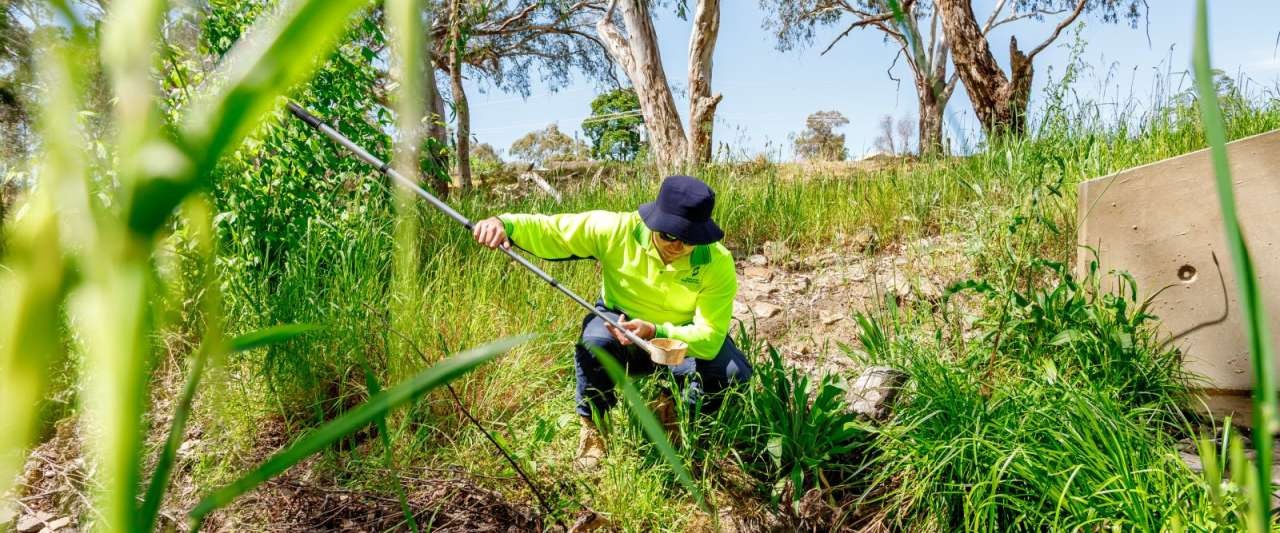Mosquito Control Program

Council’s Mosquito Monitor and Control Program assists in early detection and control of arboviruses by providing surveillance, mosquito control and development of a disease control plan.
Program overview
Council’s mosquito control program began in 1974 after a state-wide outbreak of Murray Valley Encephalitis. The program is jointly funded by the Victorian Department of Health and runs all year round.
The program focuses on monitoring, prevention and education to manage mosquito populations effectively and safely.
- Adult mosquito trapping is conducted weekly at four permanent locations representing different environments within the municipality. The mosquitoes caught are sent to the Department of Primary Industries in Attwood, Melbourne, for identification. The resulting data provides valuable insight into long-term trends and disease outbreak patterns.
- Larval monitoring is carried out at approximately 120 sites, including drains, swamps, lagoons, ephemeral creeks and depressions. This provides localised information on mosquito species and population levels.
- Environmental management is ongoing, with continual site improvements and drain re-engineering to reduce mosquito breeding across Greater Shepparton.
- Council’s Mosquito Monitor and Control Officer offers advice and educational materials to help residents reduce breeding sites around their homes.
- Chemical spraying for adult mosquitoes is not conducted, as it is more efficient and environmentally safer to control mosquitoes during their larval and pupal stages.
Responsibility for private properties
Council does not spray private yards for mosquitoes. Property owners are responsible for insect control on their land.
Council can identify potential breeding sites and offer advice on reducing mosquito breeding and protecting yourself from bites. If you wish to have your property treated, you can contact a pest control contractor to discuss available barrier treatments.
Treatment of bushland areas
Council can assess council land and roadsides for mosquito breeding sites. If a site is identified as a major source of nuisance mosquitoes, it may be treated with a suitable larvicide.
State Parks and Reserves, however, are the responsibility of the relevant controlling authority.
Use of chemicals in mosquito control
Where possible, non-chemical control methods are preferred. These include:
- Draining and weed removal
- Encouraging natural predators such as dragonfly, damsel and mayfly larvae, fish and water beetles
When chemicals are necessary, they are used only during the vulnerable larval stage. The preferred product is a sustained-release larvicide that prevents adult mosquito emergence for about one month after application. This method minimises disruption to the relationship between larvae and their natural predators.
Mosquitoes and HIV/AIDS
Mosquitoes cannot transmit HIV/AIDS. There are several reasons for this:
- Infected individuals do not have consistently high levels of HIV in their blood.
- Mosquito mouthparts retain only tiny amounts of blood.
- Biting insects typically rest to digest a blood meal before biting again, rather than immediately moving to another person.
- HIV cannot survive long inside an insect.
Personal protection
- Where possible avoid using aftershaves and perfumes as these attract mosquitoes.
- Mosquitoes are attracted to dark colours and are more active at dawn and dusk, so where possible wear light coloured, long loose clothing during these times.
- Use a repellent which contains Picaridin or DEET (Diethyl-M-Toluamide), preferably in a cream or gel base.
- Use ‘knockdown' sprays, coils and vaporising devices to kill or repel mosquitoes around the home.
Household hints
- Clean up around your house; dispose of tins, tyres, bottles, buckets and other rubbish which may hold water, overturn boats to prevent pooling of water.
- Keep drains and roof guttering free of leaves and debris.
- Empty children's wading pools weekly.
- Install and maintain fly-wire screens on all windows and doors.
- Exclude mosquitoes from water tanks and septic systems by ensuring that they have close fitting tops, lids, covers and that all inlet and outlet pipes are screened.
- Stock fish in garden ponds and operate water features regularly to inhibit mosquito breeding.
- If your pond is not stocked with fish or water plants, a small amount of kerosene or paraffin oil poured onto the water surface will inhibit mosquito breeding. *Note - Kerosene and paraffin oil may kill fish and plants.
- Regularly change the water in vases, bird baths and pets bowls.
- Place sand in pot-plant saucers to absorb excess water.
- Chemical barrier treatments applied to exterior walls and eaves can reduce mosquito populations around the home.
Related links
- The 'Protect Yourself from Mosquitoes' campaign has been developed in response to flooding and increased mosquito numbers across Victoria.
- The Mosquito Control Association of Australia is an organisation formed through membership and operated by an elected management committee.
Publications
-
Provided by the Victorian Government Department of Health.
-
Provided by the Victorian Government Department of Health.
-
Provided by the Victorian Government Department of Health.

